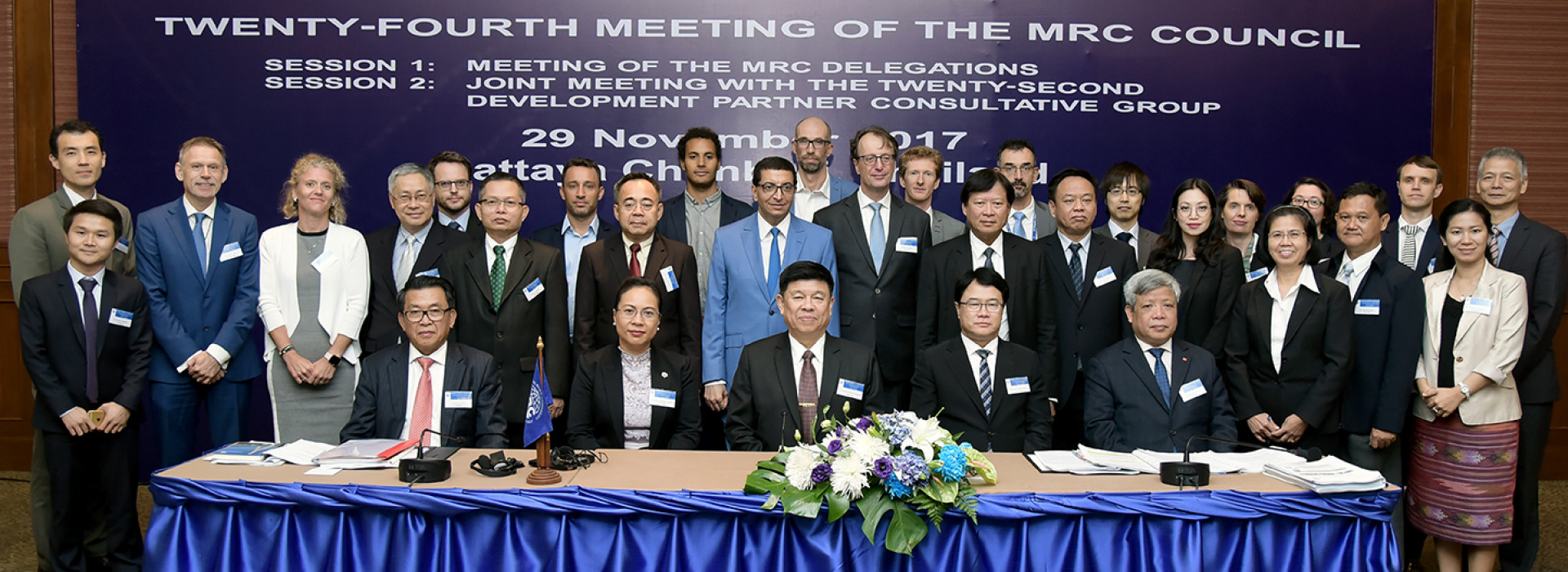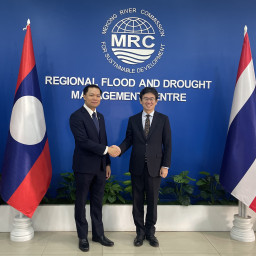Annual Mekong River Commission Council meeting considered and approved countries financial contribution and a number of basin-wide strategies
29 November 2017, Pattaya, Thailand – Today, the Mekong River Commission (MRC) Council comprising water and environment ministers of Cambodia, Lao PDR, Thailand and Viet Nam gathered for its Twenty-Fourth Meeting in Pattaya, Thailand. The meeting was to review the MRC work in 2017 and make a decision on future direction for the MRC in 2018, including approving the Annual Work Plan.
At the welcome address, H.E General Surasak Karnjanarat, Thai Minister of Natural Resources and Environment, Chairperson of the Thai National Mekong Committee, and Chairperson of the MRC Council for 2017 stated that: "While cooperation has always underlined the work of the MRC, even stronger cooperation, joint efforts and partnerships are needed more than ever and will be instrumental for MRC during the coming years to effectively address key basin-wide opportunities and challenges from climate change including extreme floods and droughts, past, ongoing and future impacts of development so as to maintain our momentum and concerted commitment to the water-food-energy nexus”.
As a major sign of commitment to MRC cooperation, the meeting considered and approved the new formula for financial contributions by member countries from 2019 towards equal contribution by 2030. The Council also approved two basin-wide strategies to address key challenges and opportunities – the Mekong Adaptation Strategy and Action Plan (MASAP) and the Basin-wide Fisheries Management and Development Strategy (BFMS).
The Council heard the update on the completion of the Study on Sustainable Management and Development of the Mekong River including Impacts by Mainstream Hydropower Projects (so-called Council Study). The Study is expected to provide balanced recommendations to the member countries in adapting their respective national plans and projects, increasing the benefits while reducing the potential adverse transboundary impacts. Strengthening cooperation among countries and partners for future application of the Study was confirmed to be essential.
The Council also took note on progress of the preparation for the 3rd MRC Summit 2018, the most significant and highest political event on the MRC calendar, to take place in April 2018 in Siem Reap.
A Joint Meeting with the 22nd Development Partner Consultative Group was organised, bringing together MRC’s Development Partners, Dialogue Partners (China and Myanmar) and others. To highlight importance of the partnership, General Karjanarat said: “Our Dialogue Partners are vital for the whole management of the Mekong Basin. Our Development Partners provide essential financial and technical support we need. Our other partners are critical for the additional support in targeted areas that realise the achievements of the MRC Strategic Plan”. Presented by the Ambassador of France, on behalf of the Development Partners, the Development Partners congratulated the MRC on a number of outstanding achievements during 2017 and provided views on enhancing and supporting MRC work next year.
Before the Council meeting, the MRC organised its Joint Committee Preparatory Meeting for the Council Meeting to discuss several issues including the draft Joint Action Plan on the Pak Beng Hydropower Project and the implementation of MRC Procedures.
The Mekong River Commissionis the intergovernmental organization established to promote cooperation on the sustainable management of the Mekong basin whose members include Cambodia, Lao PDR, Thailand and Viet Nam. The MRC acts as a platform for water diplomacy and regional cooperation in which member countries share the benefits of common water resources despite different national interests, and address transboundary pressures in the basin. It also serves as a knowledge hub that promotes regional cooperation and policy-making based on scientific evidence. The MRC is not a supra-national or regulatory body. The commission looks across all sectors including sustaining fisheries, identifying opportunities for agriculture, maintaining the freedom of navigation, flood management and preserving important ecosystems. Superimposed on these are the future effects of more extreme floods, prolonged drought and sea level rise associated with climate change.
-END-





